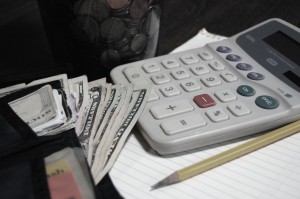Steps on how to Exchange Currency
- Decide how much money you want to exchange. Remember you don’t have to exchange
 all your money at once.
all your money at once. - Find the current currency exchange rate. To find your currency rate, start with the currency you hold in hand, not the foreign currency. The most up to date rates you will find is on the internet, but you can also look in a local paper. Don’t always trust the exchange booths to give you the real exchange rate. If you are online, do a search for a currency calculator. The currency you hold will be at the value of 1. The exchange rate is the value next to the currency you are exchanging (the foreign currency).
- Calculate how much money you will have after the exchange. Multiply the money you have on hand by the exchange rate to get the money you will have after the exchange.
a=money you have before the exchange
b=the exchange rate
c= money you will have after the exchange.
a*b=c (money before the exchange x the exchange rate = money after the exchange)
a=c/b (money before the exchange = money after the exchange / the exchange rate)
An Example on how to exchange currency: You want to convert US dollars to British Pounds. As of the revision, 1USD = .65446 GBP. Your exchange rate = .65446. If you want to exchange 500 USD, then 500 USD x .65446 = 327.23 GBP. That is how much money you will have in pounds after the exchange assuming you got a fair rate of exchange. Or if you have a smart phone and can do the calculation right before the exchange. Just enter 500 USD into the currency calculator and you will get 327.23GBP.
Exchange Currency by Working backwards: If you want to buy something worth 800 Euros and want to know how much that is in your currency (for example: USD) then first find the exchange rate. Remember to enter in your currency at 1 and you will see that the Euro is .77598 (rate is from the time of revision). Calculate 800 EUR / .77598 = 1,030.96 USD.
Thanks for visiting How to Exchange Currency. Read more on Where to Exchange Currency and where to exchange your money abroad. Or visit What Are Exchange Rates.







